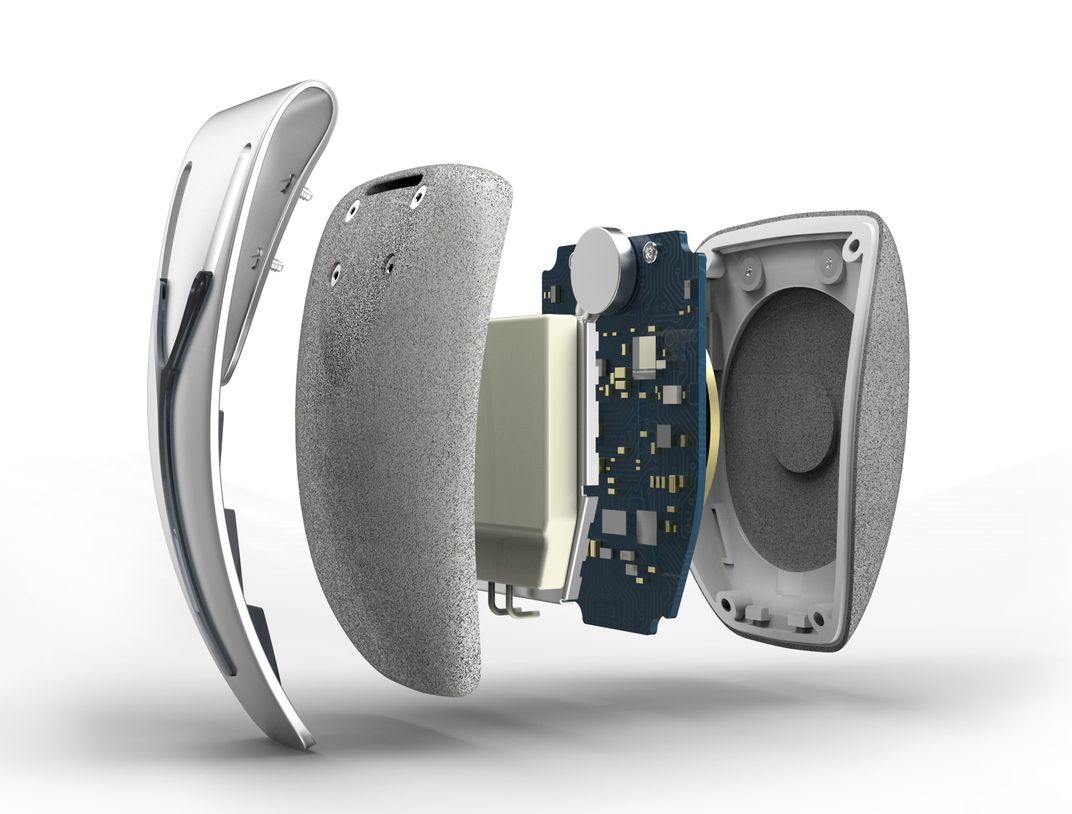Stressed? The Latest In Wearables Could Help Keep You Calm
Spire, a clip-on Bluetooth device available this fall, keeps tabs on stress by monitoring how you breathe
/https://tf-cmsv2-smithsonianmag-media.s3.amazonaws.com/filer/de/73/de73a25e-9eb1-4f95-9cfb-fc131c8b08df/spire.jpg)
In 2013, consumers bought 84 million fitness and activity tracking devices, according to a study by IHS technology. By 2019, that number will grow beyond 120 million.
While the monitors can do a lot to spur activity and encourage users to log more steps, reps, and miles, most of that encouragement comes once the day is over. What’s been missing is coaching to help users make healthier decisions in real time.
But the Spire, a Bluetooth wearable device that clips onto a bra or waistband, should do a lot to fill in that gap. Instead of measuring laps or calories, it monitors how users breathe to help them have greater awareness of and control over their stress levels.
The Spire belongs to a sub-genre of activity monitors sometimes referred to as body hackers, devices that not only track our movements and activities—or lack thereof—but also offer live feedback to help us improve our behaviors in real time. The UpRight and LumoBack, for example, send wearers subtle vibrations when he or she is slouching. There’s even a smart lighter called Quitbit to help users quit smoking.
What makes Spire different? Cofounder and Chief Product Officer Neema Moraveji designed the device from his work in respiratory psychophysiology, the study of how the brain responds to our breathing, and vice versa.
“Breath is something that’s actionable,” he says. “It’s feedback you can use immediately. We can’t control our heart rate directly. But if you ask someone to lower their heart rate, they take a deep breath.”
Research has shown that using breathing to keep ourselves calm and focused not only has physical health benefits—helping to manage hypertension, for example—but can also keep users in the proper mindset to be more productive and feel happier. Taking deep breaths also has an impact on how our bodies recover from the stressful fight-or-flight response.
From a hardware standpoint, the Spire is fairly simple.
A pair of embedded sensors gathers all the data the Spire needs. The device’s outer membrane, an extremely sensitive pressure sensor, monitors the body’s thoracic excursion, or the way the abdomen moves with the diaphragm. An accelerometer—like the sensor inside a Fitbit or Nike Fuelband—tallies steps, activity, and body position (such as sitting, standing, or lying down). The accelerometer also helps Spire differentiate when the pressure sensor is registering a breathe versus an actual movement — think of it like the noise cancelation used in headphones.

Spire funnels the data into an app, through which the user can see in real time the pace of their breathing. A color-coded background shifts its hue based on the stress level it perceives. Blue is calm; red is wound up. The app also sends alerts the user when there are spikes in stress; it might tell him or her to take deep breath, for instance, or offer a series of breathing exercises.
Those exercises can do a lot to soothe moments of extreme stress. The part of our brain that’s responsible for emotions, the amygdala, is very sensitive to carbon dioxide, so increasing the amount of oxygen in the blood helps the amygdala know the body is not choking or drowning. A long exhale slows the heart rate and taps the vagus nerve (the body’s longest cranial nerve), which tells the brain to rest.
Surprisingly, crunching all that data has little impact on the device's battery life, which tops out at about a week.
“There’s a lot of data processing happening in the cloud and on the phone,” Moraveji says, instead of on the device itself. When it does need juice, the Spire powers up wirelessly through its charging base using a common wireless charging standard.
It's not clear yet how the device might work outside the consumer market. The Spire is not currently considered a medical device—a classification that would require a long series of FDA approvals to substantiate its claims— but its sensitivity could prove to be a beneficial therapeutic tool for those with hypertension, post-traumatic stress, and respiratory illnesses, such as asthma.
For the time being, however, the company will remain focused on the consumer market, Moraveji says. Spire is currently available for pre-order for $119, and will go on sale this fall for $149.
/https://tf-cmsv2-smithsonianmag-media.s3.amazonaws.com/accounts/headshot/me.jpg)
/https://tf-cmsv2-smithsonianmag-media.s3.amazonaws.com/accounts/headshot/me.jpg)